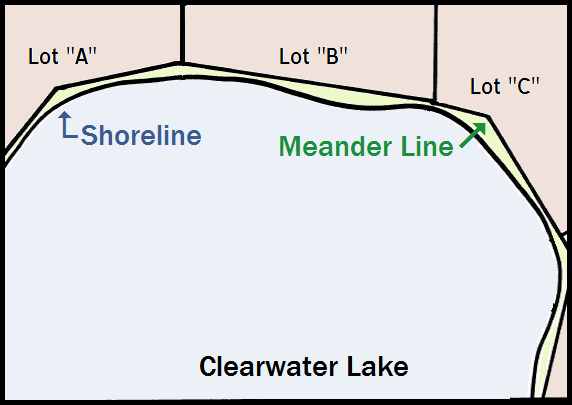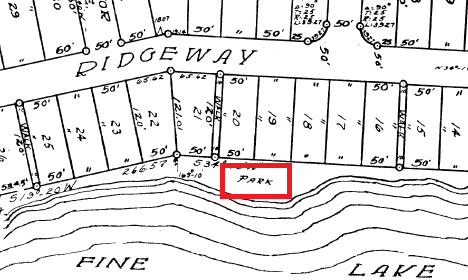Meander Lines
A small strip of land does not necessarily mean a lack of riparian rights

Typically, for a piece of property to have riparian rights, the land must physically touch the water's edge of a Michigan inland lake, river, or stream. A lack of physical connection runs solely to the property which actually has the body of water's boundaries.
However, Michigan law recognizes a practical problem with such plats: shorelines are not straight.
To solve that problem, Michigan case law has recongized the existence of "meander lines" within property plats.
Meander lines have been defined as drawn lines which:
run in surveying fractional portions of the public lands bordering upon navigable rivers, not as boundaries of the tract, but for the purpose of defining the sinuosities of the banks of the stream, and as the means of ascertaining the quantity of the land in the fraction subject to sale, and which is to be paid for by the purchaser.
Although meandering is more characteristic of watercourses than of lakes, meander lines may be used in platting land bordered by lakes as well. A lot extended to a formal meander line encompasses all land to the water's edge, even if the meander line as formally portrayed does not actually reach the edge of the water.

Example of a meander line as compared to shoreline
Thus, Michigan law recognizes that "when a plat shows a lot is bounded by the meander line of a lake, the grant of land is to the water's edge," and thus is riparian property.
But, be careful, there are differences in plats with an assumed meander line and the actual existence of an actual small piece of land.

Notice that a 'Park' exists between the edge of the lots and the lake.
These lots likely lack riparian rights.
Protect Your Rights
OLC represents private land owners regarding disputes with local governments, enforcement officials, neighbors, home and property owners associations, and others. Contact
a riparian rights attorney at Outside Legal Counsel today.
Riparian Resources
 Riparian Basics & Law
Riparian Basics & Law
 Riparian Extensions
Riparian Extensions
 Private Docks
Private Docks
 Lake Views
Lake Views
 The Great Lakes Difference
The Great Lakes Difference
 Public Road Ends
Public Road Ends
 Public Act 56
Public Act 56
 Meander Lines
Meander Lines
 Keyholing/Funneling
Keyholing/Funneling
 Natural Rivers Act
Natural Rivers Act
Other Resources
 Agriculture
Agriculture
 Zoning
Zoning
 Easements
Easements
 Natural Rivers Program
Natural Rivers Program
 Right to Farm Act
Right to Farm Act




